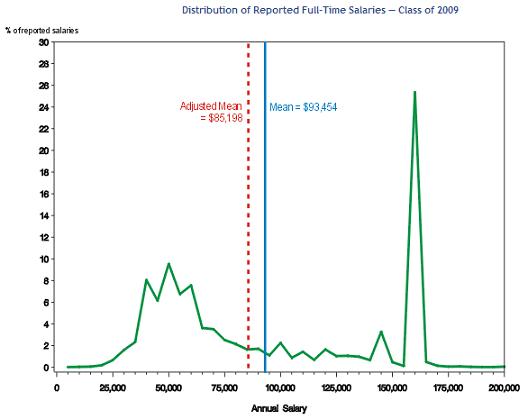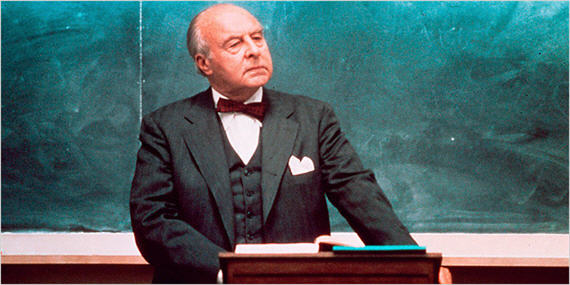All Lawyers Aren’t Rich!
Some lawyers make a fabulous salary right out of law school. Most don't.
The law blogs are buzzing over the not-news-to-me findings of a new National Association for Law Placement study showing that not every law school graduate starts out making $160,000 the second they finish school. Indeed, the actual distribution is bimodal, with a relative handful going on to make obscene sums at highly competitive big law firms and the rest making less money.
How much less?
 So, the mean is a very nice $93,454 and the adjusted mean (which gives estimates for unreported salaries) is $85,198. Not bad for a 25-year-old kid with no work experience!
So, the mean is a very nice $93,454 and the adjusted mean (which gives estimates for unreported salaries) is $85,198. Not bad for a 25-year-old kid with no work experience!
But, of course, not everyone makes the mean. Indeed, some make less! A handful can’t get jobs at all and some take jobs making very piddly salaries. Oh, and there’s apparently some sort of economic downturn.
NALP:
The overall employment rate of 88.3% for Class of 2009 graduates for whom employment status was known represents a 3.6 percentage point drop from the recent historical high of 91.9% for the Class of 2007 and masks a number of weaknesses in the job market faced by this class. For example, separate research from NALP found that between 3,200 and 3,700 graduates who reported jobs in law firms had their start dates deferred beyond December 1, 2009. In addition, a far higher percentage of this class reported employment that was temporary, with 41% of public interest jobs reported as being temporary, 30% of business jobs being reported as temporary, 69% of academic jobs being reported as temporary, and even 8% of the private practice jobs being reported as temporary. Overall, nearly 25% of all jobs were reported as temporary, a figure that includes judicial clerkships.
NALP also found that 21.6% of Class of 2009 graduates who reported being employed were seeking a different job. NALP first started collecting information on the search status of employed graduates with the Class of 1994, which also faced a challenging market, and found that almost 23% of Class of 1994 graduates were seeking a different job. The rate dropped from 23% to about 11% in 2000, but has risen since and took a particularly sharp upturn for the Class of 2009, after hovering in the mid-teens for a number of years.
“The job market for the Class of 2009 was very different than it was for the classes that immediately preceded it,” according to Leipold, “and we have gone to great lengths to try to measure and describe some of those differences. Members of this graduating class were more likely to be working part-time, working in a temporary job, working in a job that does not require a JD, working as a solo practitioner, or working but still looking for another job, than their peers who graduated in the classes before them. This volume of Jobs & JDs describes those differences in great detail.”
So, things are apparently tough all over!
ATL’s Elie Mystal, a Harvard Law grad, thinks prospective law students should be more aware of the economics of their chosen profession.
A lot of wanna-be lawyers claim that they don’t even want to make $160K. Fine. But understand the curve. If you don’t make $160K, it’s not likely that you’ll make just a little bit less — say, $120K. It’s not likely that you’ll make the average; it’s not even likely that you’ll make the median. If you don’t win the $160K lottery, chances are you’ll be clumped into the left-hand side of the curve, earning somewhere between $30,000 and $60,000 a year. That’s the kind of pay that a lot of people can get without three years of post-graduate education and six figures of debt.
George Mason lawprof Ilya Somin thinks it’s not so bad.
There is no doubt that only a minority of new lawyers will get 160K starting salaries and that most will earn a great deal less than that. This is not a new finding by any means. Still, the NALP data does not change the fact that most lawyers earn quite impressive incomes. It is important to remember several key points that have been absent from most of the discussion of the data so far.
First, these are merely entry-level first year salaries. In law, as in most professions, pay increases with years of experience. Data on overall lawyers’ salaries compiled by the Labor Department shows that the median lawyer makes some $113,000 per year (meaning that 50% of lawyers make that much or more). Even lawyers at the 25th percentile of pay in the profession make about $76,000 per year. You have to go to the bottom 10% of the profession to find lawyers making under $55,000 per year. Thus, claims that most lawyers can expect to earn “somewhere between $30,000 and $60,000 a year” are misleading at best.
Second, the data for the Class of 2009 are taken from a year that saw the worst economic downturn in some 30 years. In such a period, employment prospects and salaries tend to be down in almost every profession. The relevant time horizon for lawyers, however, is the entire 30 to 40 year period of their expected career. On that score, it is difficult to make any precise forecasts. Still, the continued growth in the scope and complexity of law suggest that the demand for legal services is likely to rise. The demand for lawyers is inevitably closely tied to the growth of government and law.
Furthermore, the NALP data for the class of 2009 show that the median graduate has a salary of about $72,000. Even if you adjust it downward a little to reflect reporting rates skewed in favor of large firms, you still get a level of perhaps $65,000 based on the formula that NALP used to recalculate the mean salary (reducing it by about 9%. That’s not bad for an entry level salary in the middle of a deep recession.
Speaking as someone with a degree that takes longer on average to get than a law degree and pays much less, I concur.
Indiana U lawprof Bill Henderson explains the economics of the bimodal pay structure:
What are the market forces that have created this peculiar salary structure? In my working paper, “Are We Selling Results or Résumés?: The Underexplored Linkage Between Human Resource Systems and Firm-Specific Capital,” I posit that the runaway $160K mode is a confluence of two factors: (1) the continued growth in the corporate legal services market, primarily due to the growing scale and scope of transnational corporate activity; and (2) law firms’ nearly universal adherence to the “Cravath system,” which purports to hire the best graduates from the best law schools and provide them with the best training.
[…]
As the paper documents, over the last several years, profits are going up at all levels of the Am Law 200; they are just going up much faster for high PPP firms. Obviously, when firms at the top of the heap (95th percentile) pay higher salaries and bonuses, it is quite a stretch for firms at the 25th percentile to match. The money has to come from somewhere. If it comes out of the draw of a rainmaking partner, he or she has a strong incentive to seek greener pastures. That is risky; but to the majority of the partnership, departing from the Cravath model seems equally perilous. Over the last decade, virtually all large firms have adapted by increasing leverage (i.e., the ratio of total lawyers to equity partners). But higher leverage can also undercut associate morale and loyalty. So for firms at the bottom of the PPP distribution, the salary wars are one hell of a vise, particularly as the economy heads south and they are stuck with a $160,000+ cost structure.
Tennessee lawprof Glenn Reynolds advises: “The important thing, in calculating the risk/return ratio of time and money on law school, is figuring out which of the two you’re likely to end up in.” And that makes sense, although easier said than done: All law students think they’re bleedin’ brilliant.
Ultimately, it seems to me, the answer is to make sure that you really want to be a lawyer or otherwise do something for a living that requires a law degree. Law school is a major investment in time and money to make on the off chance of striking it rich.






A lot of the analysis displays an appalling lack of understanding of statistics. Medians aren’t particularly meaningful in data with this sort of distribution. Additionally, I’m tempted to assert that extreme bimodal distributions (incomes in the U. S. also show a bimodal distribution, BTW) like the one in the graph above are always artifacts. It’s the functioning of the system, not the functioning of the market.
I entered law school when LA Law was still on the air and I was actually surprised to hear some of my class mates talk as if that was the kind of career they’d be headed for — big offices, rich clients, huge salaries.
Boy, were they all surprised.
Largely true although based on what I know I’d say the grad from Yale or NYU law who lands a spot at Sullivan and Cromwell, Cleary or one of the big wall street law firms and is earning 160k as an associate is going to be working a whole lot harder that someone being paid 60k in a middle ranking firm off wall street. These kids earn a lot of money and have the chance to make a lot more but it’s a legal treadmill and after a year or two many are eager to get off it. It’s certainly a huge investment and I’d say that if you’re not in one of the top 15-20 law schools, quite a considerable risk. However, if you get into the top 20 and graduate with reasonable grades you’re pretty well set for life.
Btw Jim, $160k in NYC when you’re paying off student loans and renting a tiny apartment for about $3000 a month doesn’t make you rich!!
Do lawyers actually make something of value? Or do they use their oversized egos to find ways to redistribute wealth? The law profession doesn’t create wealth for the whole; it just siphons off what it needs. After all, lawyers make laws, interpret laws, adjudicate laws and charge the rest of us. I have little respect for them.
In my view they do. Think of lawyers as native guides through the wilderness of law that’s inevitable in a system as large and complex as ours, especially when it’s a common law system that’s been around for a while. Are such guides worth paying? I think so.
According to Charles Sellers, American lawyers were traditionally the “shock troops of capitalism.” A system of laws and their enforcement are a component of a market economy and non-violent conflict resolution. It’s doubtful that is still true in gross part, but the opposite is neither.
The risk has been amplified by the economic downturn. I recently started hiring part-time canvassers, paying $10 an hour, for a campaign I’m running. Normally the type of worker that applies is either:
-recently out of college and trying to get a way–any way–into the political world
-recently or not so recently laid off from a manual labor job.
-the more chronically down on their luck type (former felons, homeless, etc.).
Imagine my surprise on the first day of hiring when I had 15 resumes from recent law school graduates, around 10 resumes from people with masters degrees, and 2 PhD holders.
Its making me rethink studying for the LSATS…
Btw Jim, $160k in NYC when you’re paying off student loans and renting a tiny apartment for about $3000 a month doesn’t make you rich!!
Well, not the first year anyway! I’m not sure anyone who relies on an annual salary is really rich but, certainly, you can wind up in the upper percentiles easily enough with that kind of money. nd you’re probably talking $500k or so once you make partner, around age 30.
James Joyner says:
Monday, July 26, 2010 at 22:15
” but, certainly, you can wind up in the upper percentiles easily enough with that kind of money. nd you’re probably talking $500k or so once you make partner, around age 30.”
Jim do you know what % of the associate intake makes partner at blue chip law firms? It’s tiny.
And most of these law firms practice the up or out philosophy.
“Boy, were they all surprised.”
I watched The Fortune Cookie again the other night. The scene of the bigshot lawyers crammed into Matthau’s one-room office should be shown to every law school student as an act of mercy.
“Think of lawyers as native guides through the wilderness of law that’s inevitable in a system as large and complex as ours, especially when it’s a common law system that’s been around for a while. Are such guides worth paying? I think so.”
Well put. In my business you simply could not function without them.